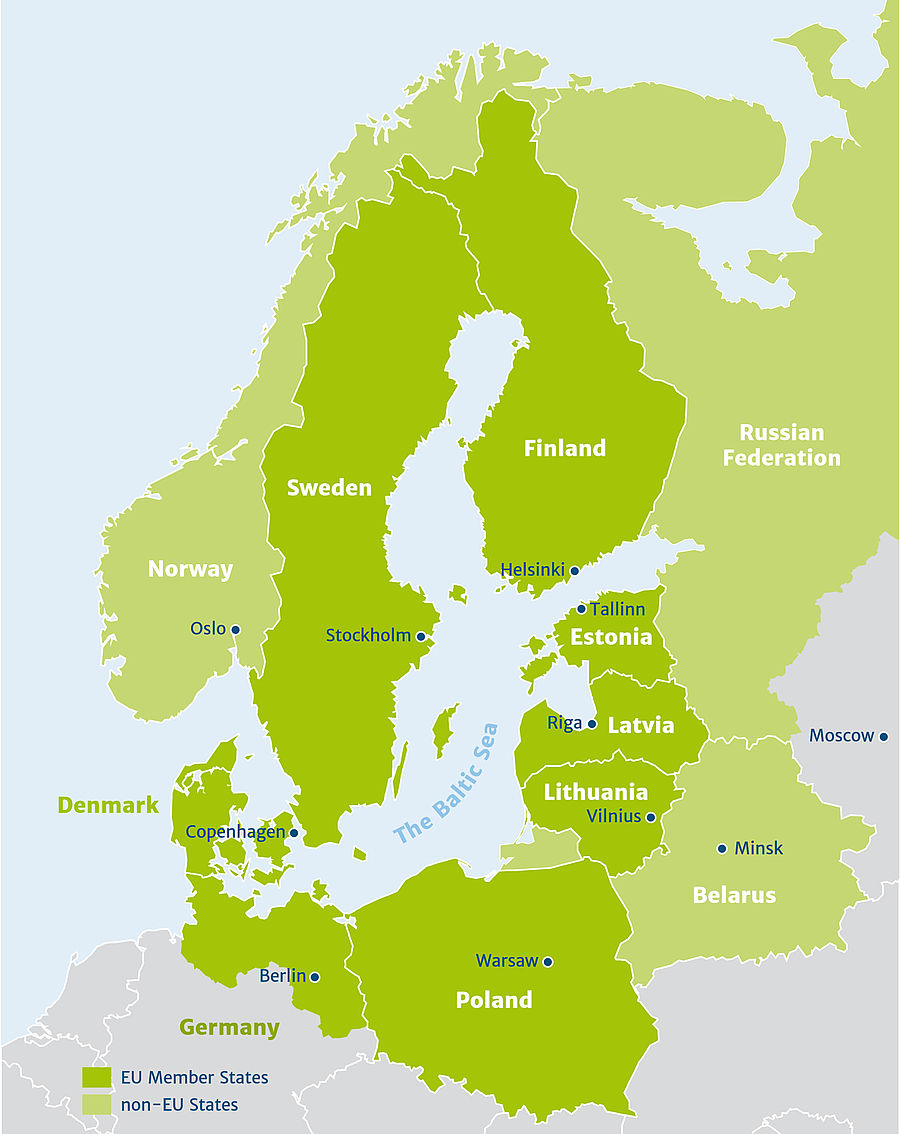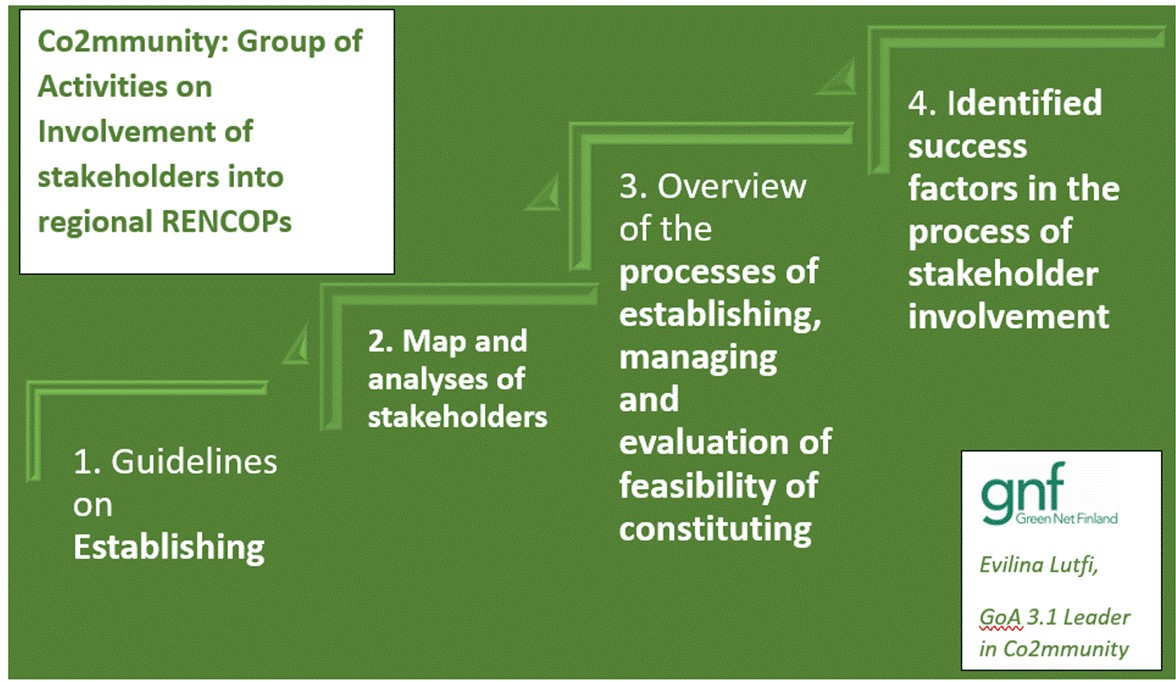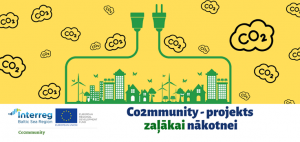What is a RENCOP ?
The Co2mmunity partners will organise Renewable Energy Co-operative Partnerships (RENCOP’s) in their respective home countries. The basic functional set-up is comprised of communities, coordinators, and experts which can for example include citizens, authorities, businesses, and academia. Every RENCOP is different, but they all aim to implement renewable energy projects which would be unmanageable by one person or group alone. Maybe you know of an example in your home country as well. The partners of Co2mmunity are establishing RENCOP’s across the Baltic Sea Region (BSR) to learn from one another regarding opportunities and pitfalls of co-operative renewable energy project development.
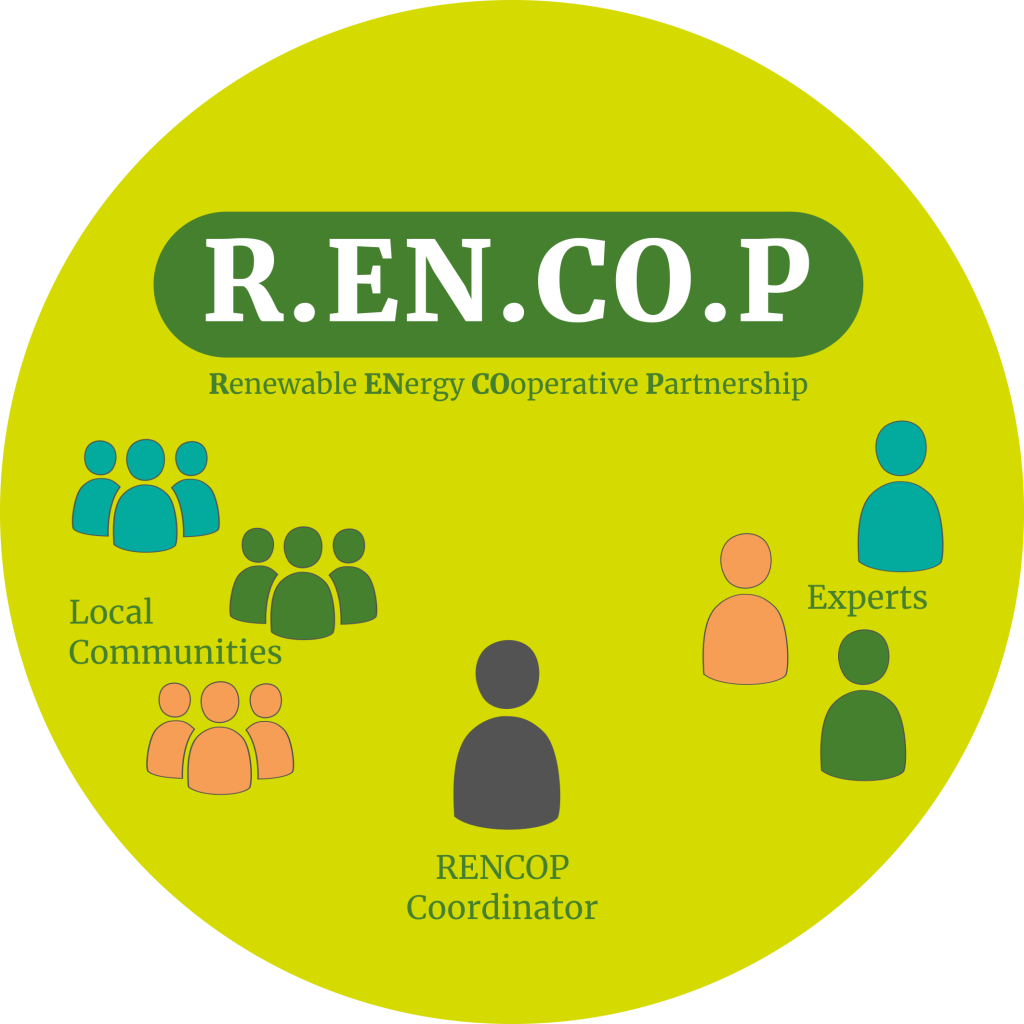
Involving CE Stakeholders in each Partner Region
Working cooperatively among diverse stakeholders, as for example in a RENCOP, can be a challenging endeavour. Therefore, different tools for getting an overview of stakeholders and managing a RENCOP have been developed as part of the Co2mmunity project. The aim is also to support the development of more local and regional RENCOP’s.
Click on the document icon to download the respective tool.
Guidelines for participatory mobilisation process to set up a RENCOP
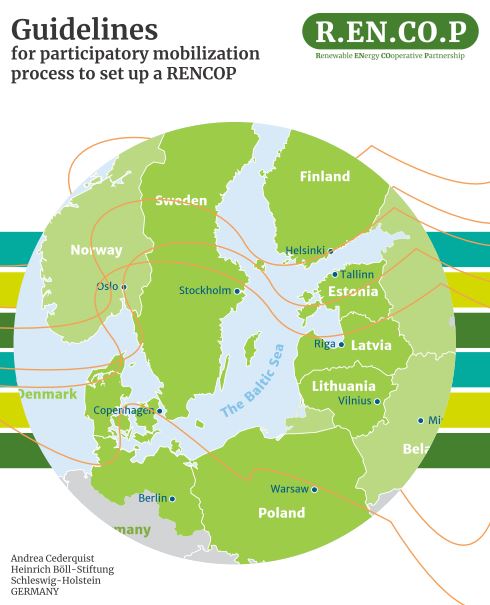
This report is providing some guidelines for those who want to embark on the journey of being a part of the Energy Transition. Although this report is developed in the context of the Baltic Sea Region, as one of the outcomes in the project, the approach is generic and can be used in all geographical areas. The aim of this report is to provide municipalities, individual citizens and/or citizens’ associations knowledge, how to develop participatory processes (i.e. RENCOPs) for stimulating community energy projects on a regional or local level.
Status by the end of the project (30.09.2020)
In this booklet as well in the section below you can find an overview of all RENCOPs in the stage by the end of the project (30 September 2020).
Below you can find a list providing more detail and an interactive map listing the project partners in each country. This section will not be further updated.
When you ask a Danish person “What is a RENCOP?” they might say: fællesskaber med fokus på vedvarende energi. As we do not all speak Danish, we have provided additional information on the Danish Co2mmunity RENCOPs below. Middelfart Municipalities strategy for RENCOP composition is often to explore possibilities. The political interest in sustainable development has encouraged the council to work with citizens in line with its tradition of seeking results more than strategies.
The stakeholders have been identified in different ways. Some were determined as stakeholders because they are “usual suspects” and well-established players in the Energy Transition. Others were found by public announcements while some came on their own out of interest and curiosity. All stakeholders have been analysed with the stakeholder mapping tool developed for the Co2mmunity project. The focus of the CE projects was chosen in different ways. Some CE projects such as Common Purchase of Heat Pumps were fixed in advance while others such as Sun over Brenderup evolved more spontaneously in the process through sharing of ideas and discussions.
RENCOP – Common Purchase of Heat Pumps
To promote the transition to neutral heating in private homes, the Middelfart Municipality is running a campaign to inform citizens on the possibility to purchase heat pumps collectively. By purchasing as a group, the citizens can reduce their investment cost for heat pumps. The Middelfart Municipality offers support and advice for the citizens such as helping to find different suppliers and ensuring that the project development process moves forward. In the end, the citizens of course still control the direction in which the project develops and if they want to make use of an offer at all.
The common purchase of heat pumps takes place twice a year, in spring and in autumn. The one taking place in autumn is arranged in collaboration with the triangle municipalities. They are associated partners of Co2mmunity and the collaboration is a witness of spreading and sharing experiences with CE projects.
RENCOP Sun Over Brenderup
The citizens of the village Brenderup decided to support the green transition. Currently, the Middelfart Municipality and some citizens from Brenderup are working on mapping the possibilities to make Brenderup a green city. The first goal is already clear: to become self-sufficient with CO2 neutral electricity through the use of photovoltaics. The citizens of Brenderup have been working on realising a large solar park with the goal to supply the city with green electricity. In order to be included in a tender for financial support, the citizens of Brenderup had to submit the project idea for the solar park to the independent, public company called Energinet that operates the Danish transmission grid. The project proposal was submitted on the 1st November 2018. The tender decision was made on the 9th November 2018, granting Brenderup with financial support of 10 øre/kW over 20 years. The solar park is planned to cover an area of 20.000 km2 and approximately 1/3 of the electricity consumption in Brenderup.
RENCOP – Termonet
By combining existing technology in a new way of thinking, the district heating coverage in Denmark can increase from 64% to nearly 100%. This is done by creating collective organisations similar to district heating companies but with individual geothermal heat pumps across a neighborhood or even in each house. With the great advantage of using low-pressure and low-temperature grids, this is done with help from a supply network based on heat absorbing vertical and horizontal plastic tubes. We call this network Termonet which can be used for both heating and cooling. Together, the energy companies TREFOR and EWII production and the municipality form an ‘expert’ RENCOP.
Termonet, also called fifth-generation of district heating and cooling, is considered one of the most sustainable technologies to meet the heating and cooling demands of buildings in urban areas. It is suited for retro-fitting and new projects for spatial planning. Based on combined ground based geothermal pipes, combined with shallow geothermal drillings, it provides cheap, clean and reliable heating and cooling, all in a way that looks into delivering demand and response services to the grid. See www.termonet.dk for more information.
Termonet Union
In November 2019, the RENCOP Termonet evolved to a new level. People around Denmark (citizens, companies, and associations) showed interest in this technology and the Termonet Union was founded online on the 16th of March 2020 as a result. A lot has happened since the association was founded and it was finally time to meet the founders and both old and new members in person. The association started to take form, a homepage was designed, and new members have joined, but the association was still missing some cornerstones, basic things like defining the purpose of the association.
On the 20th of August 2020, the time finally has come and the association Termonet had its first physical meeting. On the agenda was amongst other things getting to know each other, defining the purpose, and discussing the structure of the association. The first physical meeting of Termonet Union has been a success and the enthusiasm of the participants promises for a bright future. There has already been a great interest from energy planners, municipalities, and other stakeholders to learn more. The Union’s goal is to promote the knowledge of the Termonet technology in order to strengthen the transition to a more climate friendly heating system. Based on concrete solutions and the use of a known technology, this effort is expected to support FN´s world goals and has the potential for national and global upscaling.
The concept of Termonet has been under development since 2014 and a number of public Danish projects have helped elucidate technical, legislative, and economical aspects around the establishment and operation of Termonet. In 2017, the first Termonet has been established near Silkeborg and in 2018 the Termonet in the Middelfart Municipality has been established and several more are planned all around Denmark. It is possible for both citizens and organisations to join the association.
Føns – The First Movers
Føns Local Heating Plant is Denmark’s smallest district heating plant. It has been operating since the 1st of October 2015. The heating plant supplies 46 households with around 400 kW heat, saving 280 tons of CO2. In 2012, long before CO2mmunity, Føns started the process of finding a heating supply solution for the village. This resulted in a small district heating plant powered by woodchips. During the process of finding a common heating supply for the village, many challenges appeared, but in the end, Føns’ citizens prevailed and obtained their district heating plant. The project got its inspiration from the city of Samsø, which has a small district heating plant. Føns was able to secure the necessary number of connected users by charging a small connection fee. After successfully implementing a small district heating plant, Føns is still not finished. The small village is working on becoming even greener as they are working on new and inventive ideas.
Indslev – Large Scale Heat Pump
Indslev is one of four cities that has been chosen as case city for the ATES project. The aim of the ATES project is to analyse the technical and economic possibilities of a low temperature distribution system for common supply of individual heat pumps.
In Estonia, the development of community energy is still at a relatively early stage compared to countries such as Denmark or Germany. Initial attempts to establish energy cooperatives took place in 2015 and 2016 when the Energy Cooperatives Mentor Programme was implemented by the Estonian Development Fund. It was funded by ERDF and supports Estonian start-ups and their development through workshops, peer-to-peer learning, and mentorship programmes. The programme included 10 CE projects. Legislative gaps and obstacles to CE were identified in the programme and over the past couple of years, they were in part rectified by national law.
Currently, the Tartu Regional Energy Agency organises local RENCOP activities in Estonia. There is a relatively low level of awareness and preparedness in the field of energy cooperatives. The main activities and objectives of the Estonian RENCOP are:
- Increasing the awareness of citizens, local municipalities, and communities about the possibilities of community energy cooperatives. The RENCOP shares the information about the benefits of cooperative production and consumption of energy, different technologies, and opportunities for communities.
- Spotting the stakeholders and interested communities to involve in RENCOP activities in future and the CE issue in general.
- Working with specific CE initiatives
The first RENCOP meeting was held in May 2018, targeting rural communities and associations of individual apartment buildings’ residents. The workshop spread ideas and benefits of CE projects in addition to knowledge on CE and cooperatives in general. The aim was to initiate new projects, to provide expert knowledge, and to help to build a network among practitioners.
The knowledge shared included benefits of CE, activities for realising a CE project, lessons learned from the Estonian Energy Cooperatives Mentoring Programme and a crowd funding model. This was then followed by leaders from existing cooperatives sharing their experiences. The last part formed a discussion on CE obstacles and how to overcome such obstacles for the project realisation. The RENCOP focuses on experts as drivers of new projects as the interest among citizens was low at the beginning. Thereby, most of the experts can be sourced from TREA. In future, this is expected to change to establish community driven energy projects as well.
TREA’s RENCOP experts have also visited eco-communities and shared the information and knowledge in the general meeting of Estonian eco-communities in January 2019. Simultaneously, TREA has identified local municipalities as important stakeholders and thus paid attention to disseminating information and raising awareness at this level. RENCOP experts have already visited and contacted some municipalities, more local municipalities will be contacted in the nearest future. By March 2019, two CE initiatives joined the Estonian RENCOP and now participate actively: Lilleoru ecovillage installing PV panels for central buildings and the Apartment Association Kalda 64 in Tallinn, also installing PV panels on the roof as part of a larger renovation project.
The need for RENCOP-like entities has clearly emerged from the activities. Potential communities that would have an interest in producing their own energy do not have enough knowledge of the possibilities of creating and managing energy cooperatives, and the complexity of legal space and lack of awareness of funding opportunities raises hesitations and fears. The free support and expertise of the RENCOP experts in such a situation is very important.
Experts gathered in Tallinn, September 12, 2019
RENCOP core experts organised an afternoon meeting for selected relevant experts and other stakeholders in Tallinn on September 12, 2019, in order to discuss the current status of CE, possible action plans for the development of CE projects as well as to get fresh ideas and opinions and to inform key experts about the Handbook and Policy recommendations developed by the Co2mmunity project. The meeting determined main current barriers for energy cooperatives in Estonia (lack of motivation, lack of working financial schemes, lack of „passionate“ leaders, lack of knowledge etc.) and recommendations to overcome these barriers.
RENCOP seminar in Tartu, December 4, 2019
The next Estonian public RENCOP seminar was held in Tartu on December 4, 2019. 20 participants from mainly South-Estonian regions attended the meeting, representing potential CE initiatives, apartment associations, NGOs, local stakeholders and local municipalities.
The first part of the seminar was about community energy, the steps carried out so far in this field in Estonia, the Co2mmunity project and the RENCOP approach as well as good examples of CE in Estonia and neighbouring countries (Germany, Denmark, Finland). The core topic of the first part was about renewable energy communities, the amended renewable energy directive, and the adoption of Estonian law from a national level point of view presented by the Energy department of the Ministry of Economic Affairs and Communication.
The second interactive part of the seminar was dedicated to the CE country-specific handbook (developed by the Co2mmunity project). Responsible experts introduced nature, content, and main topics of the handbook. Following the handbook, main topics under common discussion were:
- main current obstacles, what specifically prevents you from setting up a CE project?
- what would be the solutions?
- what can a municipality do to support community renewable energy projects?
- other hot local practical topics related to energy cooperatives (how to distribute produced energy internally within community, maintenance, CE in rural areas etc).
Results and findings from the discussion will be reflected during upcoming seminars and meetings. Some information will be used in the handbook under development. Activities agreed upon during the discussion will be implemented.
RENCOP public webinar on June 12, 2020
The 3rd public RENCOP seminar was held via ZOOM. Two and a half hours were full of presentations. Experts of TREA gave an overview about the current CE situation, Co2mmunity and other CE related projects. The new CE section at TREA’s webpage was introduced.
Two keynote presentations were given by a representative of the grid company Elektrilevi OÜ, who spoke about the conditions for energy communities and energy cooperations to join the electricity network, and by a representative of the Energy Department of the Ministry of Economic Affairs and Communication, who spoke about news in legislation.
Estonian Co2mmunity Final Conference in Lilleoru, September 24, 2020
Due to the COVID situation, the event was organised in a hybrid way. The main theme of the conference was „Communities and joint action in the field of energy“. On the one hand, the focus was on the community spirit and joint activities in general, and on the other hand, specifically on the Co2mmunity project and the nature of the RENCOP model.
The main activities were:
- introduction and tour of the community (one of RENCOP pilots), energy solutions for the Lilleoru learning center and the Co2mmunity RENCOP project in Lilleoru
- Co2mmunity videos were available for followers via ZOOM
- The main speaker was Toomas Trapido (founder of the Gaia Academy and one of the leaders of the Association of Estonian Eco Communities), title of the presentation: “Communities and joint activities in the field of energy”
- The TREA RENCOP coordinator presented the achievements of the Co2mmunity project, including the roadmap, and spoke in more detail about the RENCOP model.
TREA RENCOP experts have established a specific Community Energy section on TREA’s general webpage. It gathers information on the development of CE in Estonia, informs about upcoming events and advises those who have interest and questions about the CE field. The website and its possibilities are actively introduced at all events and meetings.
The TREA RENCOP expert group will continue to operate, to disseminate the information as well as to search and support new CE initiatives after the end of the Co2mmunity project.
RENCOP in Finnish is: ‘uusiutuvan energian yhteisöhankkeita edistävät kumppanuus’. There are two RENCOPs developing in Finland, namely in South Ostrobothnia and in the region of Uusima around Helsinki.
Expert-driven RENCOP of South Ostrobothnia
In South Ostrobothnia, an expert driven RENCOP was formed in the beginning of 2018 to further the development of renewable energy projects in the area. The responsibility of the management of the South Ostrobothnia RENCOP was divided between the regional partner organisations Thermopolis Ltd. – Energy Agency of South Ostrobothnia and the Regional Council of South Ostrobothnia. The large amount of active local communities, such as village associations around the region, formed an attractive environment for developing CE projects together with the experts. The first objective of the expert driven RENCOP in South Ostrobothnia was to increase the knowledge and discussion on CE projects among the RENCOP members, and by this way increase their capability to enhance and foster these projects among their own work.
An ambitious topic of micro-combined heat and power generation (CHP) with its new technological solutions was chosen in the hopes of making a real change and thus to accelerate the energy transition.
In addition, the expert driven RENCOP acted as a catalyst in forming renewable energy projects connected to one of the following: biomass, biogas, solar energy, or geothermal energy. Throughout the meetings of the expert-driven RENCOP, the objective emerged to organise several open-RENCOPs for citizens in the region in order to distribute knowledge on community energy and to help forward individual CE projects. In rural areas, the most important stakeholder groups are village communities whereas in urban areas the focus is on housing companies. Nonetheless, also housing companies became of interest in 2020. In South Ostrobothnia, district heating is not fuelled by coal (like in many costal cities of Finland) and the related Co2-emmissions stem mainly from the use of peat. For some housing companies, different solutions with heat pumps and two-way district heating might be attractive in the future.
The Co2mmunity partner organisations planned together the RENCOP work in the area, organised RENCOP meetings and gave presentations at RENCOP events as well as chaired these meetings. Several stakeholders were involved not only in the expert workshops but also in the community engagement processes. For instance, the development office for the municipality of Alavus was involved in the Sunny Alavus-project, organised in 2018, which provided the citizens of Alavus municipality a chance to get information on solar energy and to participate in a common purchase of solar panels.
Solar energy evening in the municipality of Ilmajoki
Similarly, in the beginning of 2019 in Ilmajoki, a solar energy evening was organised for citizens and entrepreneurs in cooperation with the municipality of Ilmajoki and the Co2mmunity project. A need for information and discussion on solar energy systems turned out to be obvious, as more than 60 citizens, entrepreneurs, and farmers came to hear facts and local experiences on solar energy. During the evening, many questions were answered, and lively discussions took place. As a result of the event, all participants were asked about their interest in buying a solar energy system and whether they want to get more advice on it. 16 participants announced their interest for actual purchase and all of them were individually contacted afterwards.
The event partially originated from a discussion started by a local entrepreneur, who already runs a solar energy system both at his home and for his company, and who wanted to encourage other locals to buy solar energy systems for themselves. As a result of the event, some common purchases took place afterwards. For example, this entrepreneur organised a common purchase for everyone willing to participate and altogether 420 solar panels were bought for 11 destinations. The combined power output of these panels is 119 700 Wp. The size of the units varies from 120 panels to destinations of 20 panels. The importance of the event for those interested in renewable energy but not yet ready to invest in it was undoubtedly significant, as they received relevant information and contact details for their possible needs in the future.
These common purchases of solar energy systems in the municipality of Ilmajoki are an example of the crucial meaning of active, expertised citizens, who encourage others in the community and lower the threshold for the others by their own example when it comes to investing in renewable energy systems. An interesting glimpse to this aspect is shown on a video made about this active entrepreneur in Ilmajoki and the common purchase led by him. The video is a part of the virtual bus tour of the Co2mmunity project in South Ostrobothnia and can be seen here.
Reaching the grassroot level in South Ostrobothnia localities
Cooperation also had a crucial role in the case of organising a resource-efficiency evening for villages in Lappajärvi in autumn 2018, where the local leader group (Local Action Group, LAG) Aisapari with its “To the villages”-project was the co-organiser of the event. From there on, cooperation with LAG Aisapari has persisted and two energy evenings for recreational groups, such as hunting groups, in the area have been organised in autumn 2019. This has led the hunting group in Kauhava Ylikylä to further a project in the beginning of 2020, which aims for installing an air heat pump, along with improving energy efficiency in their recreational building.
The Co2mmunity partners have identified local communities in various ways to present and discuss the potentials for local CE projects. Furthermore, Thermopolis Ltd. – Energy Agency of South Ostrobothnia and Regional Council of South Ostrobothnia have been spreading the news on CE and their willingness to support particular CE projects at local events (fairs, village events) as well as in the media. Also, local papers and news as well as leads from individual conversations have been followed carefully to find possibilities for CE projects. Moreover, digital formats of knowledge dissemination and campaigning have been used increasingly in the South Ostrobothnia region and beyond nationally, as the main outputs, such as the Finnish handbook (produced in two national languages Finnish and Swedish), the RENCOP roadmap and policy recommendations (also translated in Finnish) have been distributed via e-mail and social media. Furthermore, the South Ostrobothnia RENCOP produced a virtual bus tour by filming inspirational renewable energy sites which displayed heat pumps, heat recovery, two-way district heating, biogas solutions, and solar PVs as well as local citizen action. Throughout the RENCOP process, if clear interest in particular form of renewable energy has been detected, such as solar energy in Ilmajoki, this local interest has been supported. In South Ostrobothnia, it has been evident that it is not practical to operate “from above”, but it is important to support local ideas and enthusiasm. Therefore, the RENCOP activities, which have started out as expert-led in South Ostrobothnia, have evolved towards community-led processes. Both approaches have been creatively used in South Ostrobothnia when seen necessary.
Helsinki RENCOP Development
The expert-driven Helsinki-Uusimaa RENCOP was established in January 2018. Green Net Finland (GNF) is the coordinator of the RENCOP. The operational model of the RENCOP is flexible – combining face-to-face meetings and different parallel activities such as participation in relevant events in Finland and the wider Baltic Sea Region, communicating and disseminating the Community Energy Agenda. In total, there are nearly 40 experts involved in the Helsinki-Uusimaa RENCOP, diversely representing local public authorities, the academia sector and businesses, providing services and technologies for renewable energy and/or CE projects. For example, in the loop of the RENCOP are these organisations: the City of Helsinki, the Helsinki-Uusimaa Regional Council, Aalto University, the University of Helsinki, the Finnish Environmental Centre SYKE, the Finnish Innovation Fund SITRA, Motiva Oy, and the Finnish Heat Pump Association. GNF as the RENCOP coordinator continuously communicates and shares expertise and experiences from Co2mmunity with other public funded development projects. To mention some: HUKATON, EKAT, Ilmastoviisat taloyhtiöt (Energy-wise managing companies), Cata3Pult, Smart Energy Transition and CORE.
The City of Helsinki has developed the Carbon Neutral Helsinki 2035 Action Plan (CNH2035) and the Helsinki Climate Watch (Ilmastovahti) service, which will follow the implementation of the plan. According to this plan, the total consumption of district heating should be decreased, and the share of geothermal heat and solar PV should be increased to 15%, each from almost zero. Installations of Ground Source Heat Pumps (GSHPs) and solar PV systems into existing building stocks are the focus.
The work of the Helsinki-Uusimaa RENCOP is supported by the City of Helsinki, and the RENCOP is contributing to the implementation of the CNH2035 programme by promoting energy systems to housing companies of apartment buildings. A hybrid energy system is a combination of technologies/equipment for producing heating and electricity on-site at the building. An example of a hybrid system for an apartment building is the combination of GSHP, an exhaust air heat pump (EAHP), a wastewater heat pump (WWHP) and a solar PV/collector combined with heating demand flexibility automation.
The RENCOP coordinator Green Net Finland communicates and collaborates via meetings with other projects and initiatives that are related to the same focus – enhancing renewable energy and energy self-sufficiency within community housing or within blocks of flats buildings.
The Helsinki-Uusimaa RENCOP has had overall seven meetings – 5 face-to-face and 2 online.
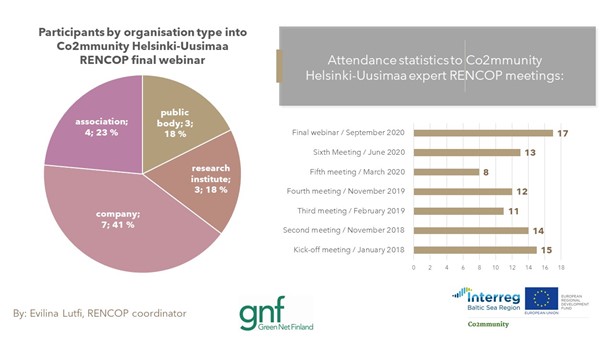
News on outcomes can be found in the following:
- Final meeting-webinar on September 29, 2020
- Meeting on June 12, 2020
- Meeting on March 3, 2020
- Meeting on November 27, 2019
- Meeting on February 27, 2019
- Meeting on November 21, 2018
As a part of its work, the Helsinki-Uusimaa RENCOP implemented a lecture at the Climate School in the Helsinki Hall on September 12, 2019: Record (in Finnish).
Furthermore, weh ave written and widely disseminated relevant blogs and posts. Our blogs (in Finnish) can be found in the following:
- ARA – Energia-avustus, Energiatodistus, E-luvun laskenta ja Energiahallinta pähkinänkuoressa
- Aurink osähköjärjestelmien kannattavuuden vertailua – Helsinki-Vantaa vs. Vilnassa Liettuassa
- Utta potkua energiahukan nujertamiseen v. 2020 alusta?
- Kerrostaloyhtiöiden kaukolämmön ja sähkön kulut Helsingissä nousivat n. 6% vuodessa.
- Taloyhtiön ostoenergian kulut kuriin – rahaa korjausvelan vähentämiseen ja asuinolosuhteiden parantamseen
- Kohti parempaa asumista aurinkoenergiaa hyödyntämällä
- Virossa tukijärjestelmät hellivät uusiutuvan energian ja energiatehokkuuden investointeja
Through Co2mmunity related communication and visibility activities, Green Net Finland achieved more than 5.000 views or impressions and has got over 200 comments and likes.
Our RENCOP – The “Klimanetzwerk – Rendsburg/Eckerförde”
RENCOP in German would sound something like this: Kooperative Partnerschaft für Erneuerbare Energien, we simply call it Klimanetzwerk – Rendsburg/Eckernförde. It is a regional strategic (community renewable energy) network. It entails key regional civil society organisations and associations: the Evangelisch Lutherische Kirche (Luth. Church), the Heimatbund (Heritage Association), the Naturfreunde (Nature Friends), the Landfrauen (Country Women’s Association), the Volkshochschule (Adult Education Center), the climate management of the regional authorities (Kreis Rendsburg Eckernförde), as well as a number of various CE experts.
The German RENCOP in the Rendsburg-Eckernförde district is organised by Energiebürger.SH: the Co2mmunity partner in Germany (hosted by the Heinrich-Böll-Stiftung Schleswig-Holstein).
Energiebürger.SH has the aim to enhance civic involvement: to inform citizens and honorary politicians about climate change, regional impacts, and opportunities relating to renewable energies, as well as to engage people to actively participate in the German Energy Transition. It is a union of various educational institutions and the Church, Nordkirche. The Heinrich-Böll-Foundation of Schleswig-Holstein is an agency for cross-party independent political education and is one of the key actors of Energiebürger.SH. The foundation strives to foster democracy and participation among citizens, and to empower people to become active in the Energy Transition.
Switching to renewable energies and climate protection are global issues that many people are itching to deal with on a local level. Therefore, many small steps need to be taken and not only great leaps. So how is it possible to make a local change? The education and project initiative Energiebürger.SH is designed to help citizens and people engaged in communal politics who wish to contribute to the Energy Transition process within their municipality and region. For more information have a look at their flyer.
Energiebürger SH is seen as a strategic partnership for fostering the Energy Transition and is currently engaged in the county of Rendsburg-Eckernförde to establish a RENCOP. Rendsburg-Eckernförde is politically committed to the Energy Transition and has published a climate concept for the region, the ‘Klimaschutzkonzept Kreis Rendsburg-Eckernförde’. Our goal with the RENCOP is to strengthen and empower citizens to take an active role in the Energy Transition in their community.
During 2019, we have organised numerous events in the region. To help inform and empower not only citizens but also politicians, we have organised seminars regarding the possibilities and potentials in initiating CE projects, and we have subsequently built-up the Klimanetzwerk – Rendsburg/Eckerförde. This has the overall aim, to reach out in society through new alliance to groups, which have not been active within the community energy movement the energy transition.
Our activities
We started with highlighting the issue of wind power, which has been a politically challenging topic in the region. The Government halted the expansion of wind energy until 2020, therefore, we felt that there was a need to disseminate information on the issue. We started with “wind seminars”, and additional seminars surrounding other sources of renewable energy production such as solar and bio thermal followed during autumn. Two seminars have been conducted in relation to wind energy:
- Political Planning Processes (Flyer): The public planning authorities in Schleswig-Holstein are currently in the process of drawing up new spatial plans to ensure an orderly development of wind power plants in the state. This is a participatory process. Therefore, to engage municipalities and citizens in the RENCOP area, Energiebürger.sh hosted a regional planning meeting regarding wind energy development for the state of Schleswig-Holstein on the 4th of December 2018. Approximately 40 people attended this meeting, including citizens, lawyers, and ministry representatives for regional wind planning. The aim of the seminar was to inform municipalities and citizens on the status of public land use planning for wind energy (Presentation1), as well as the possibilities and procedures to give input into the spatial planning process (Presentation2). A follow-up meeting took place on the 14th of March 2019.
- Strengthening Regional Value Chains (Flyer): The focus of the second seminar was to inform municipalities and citizens about opportunities to strengthen local or regional value chains while promoting CE projects. The mayor of Klixbüll, Werner Schweizer, gave his insights on how the municipality of Klixbüll was tackling the challenges of the Energy Transition, turning the transformation into an opportunity for the region.
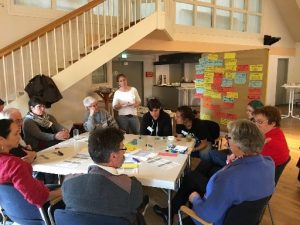
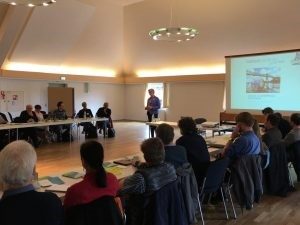 We organised a scenario workshop on possible futures relating to the Energy Transition in Schleswig-Holstein, focusing on implications for the county of Rendsburg-Eckernförde. This RENCOP workshop was held in cooperation with the county of Rendsburg and various civil society groups from the region. A great number of participants – young and old – discussed about possible futures and actions needed to hamper climate change.
We organised a scenario workshop on possible futures relating to the Energy Transition in Schleswig-Holstein, focusing on implications for the county of Rendsburg-Eckernförde. This RENCOP workshop was held in cooperation with the county of Rendsburg and various civil society groups from the region. A great number of participants – young and old – discussed about possible futures and actions needed to hamper climate change.
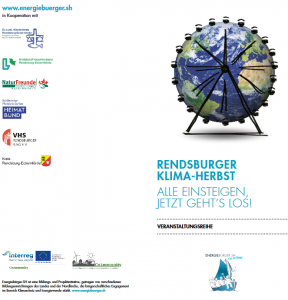
In autumn 2019, under the name Rendsburger Klima-Herbst several events have been initiated together with our partners.
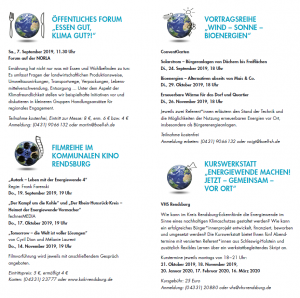
Besides our seminars we organised discussions at the fair or movie evenings with facilitated discussions on the topic of the Energy Transition.
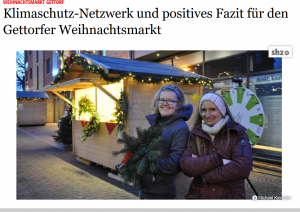 In December 2019, while the international climate negotiations took place in Madrid, together with our RENCOP partners, we organised locally, at the Christmas market in Gettorf, a stand informing about our climate network with small activities on producing homemade sustainable Christmas gifts.
In December 2019, while the international climate negotiations took place in Madrid, together with our RENCOP partners, we organised locally, at the Christmas market in Gettorf, a stand informing about our climate network with small activities on producing homemade sustainable Christmas gifts.
In January 2020, we started the Energy citizen course in Rendsburg, a course designed to enable citizens to jointly develop and implement their own CE projects. More information can be found at www.energiebuerger.sh.
During 2019 and beginning of 2020, we have built-up an informal central RENCOP with multiplier organisations, which are in the phase of developing local spin-off‘s now. In these local RENCOPs, concrete CE projects will be developed and carried out. It was planned that each partner will host a series of CE related events in their networks during 2020. Also joint events were planned. However, due to the COVID-19-situation, these events are now being re-planned and re-scheduled.
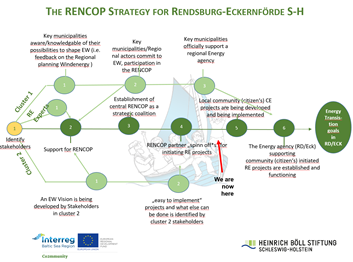 In our strategy for establishing the RENCOP, we tested the participatory guidelines while being in the role of developing them. Our theory of change (see Fig.), is a visualisation on how we thought that we would be able to implement our strategy, along which we planned our various activities.
In our strategy for establishing the RENCOP, we tested the participatory guidelines while being in the role of developing them. Our theory of change (see Fig.), is a visualisation on how we thought that we would be able to implement our strategy, along which we planned our various activities.
The Covid 19 restrictions led to the fact that many activities which we and/or our RENCOP partners had planned for spring 2020 were put on ice. Also, the tandem meeting, a Latvian-German exchange, and a study trip to Schleswig-Holstein which we had jointly planned with the Riga Planning Region, could not take place.
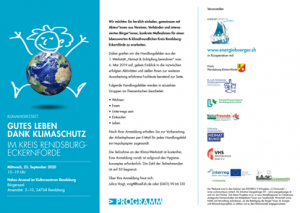 Together with our RENCOP partners, we held online meetings, but as a final event, as the COVID-19-situation allowed, we were able to organise a real physical event, while following the corona restrictions. The regional conference, which we organised together with our network partners, had the title “Good Life thanks to Climate protection”. This was the final grand meeting for the project. It had as a goal to manifest the RENCOP, as well as to open up the RENCOP, linking energy initiatives with experts, citizens, and politicians – opening-up for possibilities to pursue the roadmap for the further development of CE projects, and to look for specific options for joint actions in the fields of: housing, nutrition, mobility, purchasing, and for “good life as such”.
Together with our RENCOP partners, we held online meetings, but as a final event, as the COVID-19-situation allowed, we were able to organise a real physical event, while following the corona restrictions. The regional conference, which we organised together with our network partners, had the title “Good Life thanks to Climate protection”. This was the final grand meeting for the project. It had as a goal to manifest the RENCOP, as well as to open up the RENCOP, linking energy initiatives with experts, citizens, and politicians – opening-up for possibilities to pursue the roadmap for the further development of CE projects, and to look for specific options for joint actions in the fields of: housing, nutrition, mobility, purchasing, and for “good life as such”.
A panel discussion kicked-off the conference, reflecting on the question: What are the levers, which we can regulate to implement climate protection being understood as a contribution to a good life? The panelists were Tobias Goldschmidt (State Secretary of the Ministry for Energy Transition, Agriculture, Environment, Nature and Digitization of the State of Schleswig-Holstein), Dr. Juliane Rumpf (District President of Rendsburg-Eckernförde), Stefan Sievers (Managing Director of the Society for Energy and Climate Protection SH), Guido Froese (Academy director and managing director of the Nordkolleg). The discussion was followed by a parallel workshop session, to which we had invited experts to discuss with citizens on concrete project options and possibilities for actions (see images).
The results and outputs of the conference will be bundled, and together with our RENCOP partners, a concretisation of the action ideas will be further thought through and developed.
Latvia has a high share of renewable energy in its national energy mix. Hydropower accounts for 53% of the total power capacity and supplied about 33% of Latvia’s electricity in 2015 (IEA, 2017). Biomass has gradually replaced fossil fuels as a source for the production of electricity and heat while the overall consumption rate has also increased. A positive characteristic is the wide use of local district heating systems.
On the other hand, most district heating companies are owned by local municipalities while individual households do not possess shares in these companies. As a result, many other community energy approaches are not well-known. To date, there are only few successful examples that demonstrate direct involvement of households in the production of heat or electricity.
As part of the Co2mmunity project activities in Latvia, our project partner Riga Planning Region in cooperation with its major stakeholder – the municipality of Mārupe – attempted to implement a pilot project in Mārupe by establishing and monitoring a citizen-driven RENCOP and thus demonstrating ways how the existing problems can be overcome in practice. It was also important to resolve the myths that hindered wide implementation of CE projects in Latvia, such as:
- renewable energy is expensive;
- benefits are incomparable to the amount of investment needed;
- there is a relatively small number of sunny days in Latvia, making the use of solar energy less profitable;
- renewable energy projects should always be co-financed from the EU or other support instruments.
Pilot Project in Mārupe
To facilitate the introduction of the RENCOP concept in Latvia and to better understand the existing situation, the Riga Planning Region together with the Mārupe municipality conducted a survey in Mārupe in 2018, the results of which showed a generally positive attitude towards renewable energy. It appeared that the residents were well informed about various energy-efficient lighting or heating solutions but knew very little about community energy projects or energy cooperatives as such. To capitalise on that, two public participation workshops were organised, targeted at local citizens and NGOs as a follow-up activity in order to identify local household communities that were willing to participate in the RENCOP pilot project as well as to search for certain technical solutions. In parallel, several research studies that addressed the legal framework for renewable energy communities, the evaluation of economic potentials and the analysis of the existing situation in Mārupe, were initiated.
The results of these research studies show that there is a high potential for energy efficient local communities in Mārupe. The owners of many individual apartments already de facto exist within unified communities even if they are not aware of this and have not registered their communities as legal entities – cooperatives or household associations. However, to be able to introduce major energy efficiency improvements in an apartment house, it is also necessary that the owners of individual apartments come to an agreement with the owner of the building. This applies to both, the heat insulation of houses and the introduction of new renewable energy solutions for the development of local energy supply networks. Smaller energy communities can also be developed within the segment of detached houses, which are widespread in Mārupe, given the fact that it is a typical suburban municipality where a high percentage of residents are daily commuters. Preliminary studies have shown that the systems of solar panels have the highest potential for the generation of power implementation in detached houses.
In order to perform the assessment of energy efficient solutions in various existing or potential communities in the Mārupe district, several house owners have been approached and initial technical solutions have been developed in order to introduce ecologically-friendly renewable energy solutions in the selected pilot sites. Six public participation workshops have been organised in Mārupe since 2019 to allow local citizens and NGOs coming together, discussing the urgent issues and, more importantly, select local household communities that are willing to participate in the RENCOP pilot project that includes both a public participation process and a demonstration of certain technical solutions. In the end, two sites were selected for an in-depth analysis and pilot activities. The project team, municipal experts, and external consultants guide these citizens and provide their expertise, including technical know-how.
RENCOPs and Pilot Sites in the Municipality of Mārupe
Apartment house at Mazcenu aleja 15, Jaunmārupe
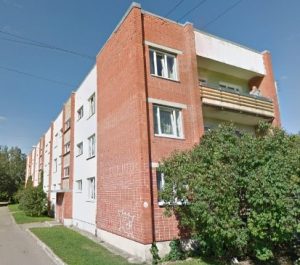
The residential building at Mazcenu aleja 15 is located in the village of Jaunmārupe. The structure was built in 1980 and is connected to the district heat supply system. Heat supply is provided by the local energy company “Sabiedrība Mārupe”, Ltd. The building has undergone full-scale renovation in 2018. There are 18 apartments in the house and the total energy consumption for hot water production is ~100 MWh/year.
In order to estimate the necessary capacity of the solar collector, data on heat consumption for hot water production has been collected and a decision was made to install a system of solar collectors with a total surface area of 20m2. The total annual production capacity of this system would then be 20 MWh which will correspond to around 20% of the total energy demand. The estimated installation costs are in the range of 12,000 EUR including all taxes. Given the current prices for heat (50 EUR/MWh), one can assume that the pay-back period of this equipment would be around 10 years.
Furthermore, it is important to consider the environmental factor, as the introduction of the proposed solution with the solar collectors will reduce the burning of the fossil energy resources, in this particular case – natural gas, by 2,100 m3, resulting in the reduction of CO2 emissions by 4,000 kg/year.
Row house at Lielā iela 160
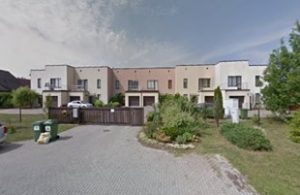
The row house project at Lielā iela 160 was commissioned in 2016. The total living area of the house is 700 m2. The heat is provided by local natural gas-fired heating boilers and the mean total gas consumption amounts to 4500 m3/year. The average electricity consumption of the house is ~ 6,000 kWh/year. Given the amount of the consumption of natural gas, the estimated energy efficiency of the building equals 73 kWh/m²/year. This energy efficiency index is much better than at most other locations in Mārupe, however, it should be assessed as average in comparison to the target of 30 kWh/m2/year set at the national level for the year 2021.
The proposed solution is the installation of a solar collector system with a total surface area of 42m². This would allow for the production of 20,000 – 30,000 kWh of heat energy. The estimated amount of costs ranges from EUR 10,000 to 15,000. Benefits are natural gas savings of 1,000 m3/year and a CO2 reduction by 1,000 – 2,000 kg/year.
Taking international and local experiences to national policy-makers
In addition to activities on a local level, the project team has also had several meetings with the national energy policy maker – the Ministry of Economics – to discuss the content of the local outputs and participated in the matchmaking event at the National Energy and Climate Plan 2030 Conference in Latvia. The NECP 2030 is the most important strategic energy and climate policy document in Latvia that details goals, instruments, and actions that contribute to the development of a climate neutral national economy. For the first time, the plan clearly demonstrates the necessity to encourage the implementation of community energy approaches in Latvia. These events provided the Riga team an excellent opportunity to strengthen the existing links to national energy policy makers.
Moreover, based on the knowledge of other Co2mmunity partners and own experiences in Mārupe, the project team elaborated community energy policy recommendations that were forwarded to the national energy and climate change mitigation policy makers in May, 2020.
Dissemination of knowledge
Given the scarce amount of information about community energy projects in Latvia, project publicity and dissemination of project outputs become an important part of project activities in Riga / Mārupe. This is being done by regularly updating information on the partner websites and by publishing articles in the local newspaper “Mārupes vēstis” (News of Mārupe). In parallel to these publicity activities, the Riga team has organised discussions with a number of local stakeholders (local municipalities, non-governmental organisations, state agencies and private energy service companies) in search for ways that could facilitate the distribution of project-related information via their own professional networks.
In order to promote the project approach and encourage more active involvement of the local community, the municipality of Mārupe has developed a sub-section on their website to facilitate communication between the municipality and its citizens on issues related to community energy, climate change, green economy and energy efficiency on a local level . The main target group of the recent publication is the local population, irrespective of age and background.
Presented in a clear and easily understandable way, the publication contains both, general information about the project and an update on Co2mmunity activities in Mārupe, including presentations from the recent RENCOP meetings and some audiovisual material. The purpose is to sustain the public participation process that has been established in Mārupe, to inform about local success stories and to give and get productive feedback to and from the local community. A special e-mail address dzivozali@marupe.lv (roughly translated into English as “Go green at Mārupe”) has been created to communicate on issues related to energy efficiency and use of renewable energy in the municipality.
For additional information on Co2mmunity / RENCOP activities in Mārupe, contact Ms Ilze Krēmere, Head of Development Division, Mārupe Municipality (ilze.kremere@marupe.lv) or Mr Ilgvars Francis, Co2mmunity administrative coordinator in Latvia (ilgvars.francis@rpr.gov.lv).
In Lithuania, the description of an energy community and the principles of its operation are defined by law (approved by the government of the Republic of Lithuania on October 30, 2019): “Renewable energy community means any independent legal entity with the purpose of operating a non-profit organization that owns, develops, consumes, stores and sells energy from renewable sources in nearby renewable energy installations.”
Collective electricity production in solar power plants is not sufficiently developed in Lithuania, however, very favorable conditions have been created for natural and legal persons to become prosumers. Prosumer initiatives (mainly solar energy) are widely developing in Lithuania – from natural persons to business entities. The creation of solar parks, along with opportunities to be shareholders in them, is more and more common.
In August 2020, 6943 prosumers were connected to the grid, and their total installed power was 64,1 MW (all types of RE). The conditions for people who are willing to be a prosumer are continuously improving.
The main drivers are:
- an expanded list of technologies, including not only solar power but also wind and biomass power plants,
- an expanded list of people’s potential to become producing consumers – there is a possibility for not only natural persons, but also legal entities,
- a reduction in the bureaucratic burden by removing the need for some permits/documents, thus reducing the installation time,
- an increased quota for prosumers – total installed capacity of 100 MW, of which 70 MW are for households and 30 MW for non-household customers,
- flexible pricing for grid access being created – producing consumers can choose from four different billing plans.
An important barrier is the historical sluggish mobilisation of the city population of cities and regions in the country. It is difficult to accept unanimous support for community-level investment and benefit-sharing.
The other main barriers grouped in areas are:
- political (government interference in market relations, lack of citizenship and responsibility in society),
- legal-administrative (lack of legislation and regulation, too little or no authority power, bureaucratic barriers, legislative limitations),
- financial-economic (lack of funding and support programs, low funding intensity, insufficient market opportunities and poor investment conditions),
- representation (inadequate media coverage of RES benefits, inefficient responsible authorities, hostile behavior of conventional energy sources, inactive self-government position),
- technical (lack of technical regulation, lack of infrastructure, insufficient supply of technical experts, insufficient technological know-how of the community),
- information and education (lack of public awareness and education, too slow response of educational institutions to changing needs, conservative community attitude to innovation).
An expert-driven RENCOP has been established in Lithuania with members including two universities, representatives from municipalities and national associations (renewable energy, solar energy), and three private companies engaged in renewable energy technology. The work and strategies of the RENCOP has been to raise awareness of community energy projects, and to clarify the social, financial, and ecological benefits. A handbook has been developed, printed, and distributed. Moreover, a poster on partnership, RENCOP models and CE projects was created, which you can download here (in Lithuanian).
A successful example of a community renewable energy project:
VšĮ Daugų Technologijos ir verslo mokykla (Public Institution Daugai Technology and Business School)
The main activity of the school is vocational training. The school has 6 buildings at its disposal: the main training building, two dormitories, a canteen, a boiler room, and a training workshop. The total area of the premises is 10,773qm and the electricity consumption is 196,000 kWh/year. Electricity is not used directly for space heating, but it is used by a boiler house and electric water heaters installed in the dormitories.
The aim of the CE project is to increase the efficiency of utility costs which means to reduce costs while maintaining quality. Preparations started in summer of 2016, hoping a call for proposals in 2017. The initialy prepared application was for a 50 kW solar power plant. In July 2018, the application was submitted to the funding organisation APVA, but has been adjusted to 100 kW.
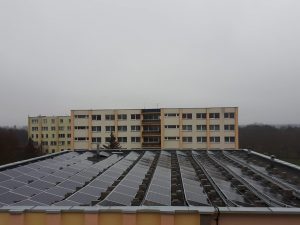
The terms of the procurement were prepared using internal resources. According to the contract with APVA, the public procurement had to take place within three months. Eleven proposals were received for evaluation. The selection criterion is the most cost-effective.
APVA allocated 80% to finance the project, and the school covered the remaining 20% of the required funds from its own budget (earned from various services). The grant was approved five months after the submission of the application.
Installation, adjustment works: the contract with the contractor was signed on April 25, 2019; on August 15, 2019 the production started. The permission to become a producing consumer was obtained on October 18, 2019.
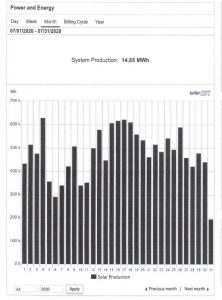
In summary: It took three years from the original idea to the moment of launch. Currently, the purchase of solar power equipment and installation works is taking place and another solar power plant (29.7 kW) is under construction. The solar power plant will be fully self-financed. The installation and commissioning will be completed until November 2020.
Perspectives:
- It is planned to produce 100% of the electricity to meet the needs of the school in 2021.
- The aim will be to move from the status of producing consumer to the status of an electricity supplier.
The Co2mmunity partner implementing the Polish RENCOP activities is the Foundation for Sustainable Energy (FNEZ).
The work of the RENCOP is focused on the opportunities for the development of energy clusters, energy cooperatives and housing associations as forms of CE.
In Poland, the CE sector starts to develop a mainly based on prosumer and distributed energy sector. In the prosumer energy sector, the energy consumer produces heat or electricity for its own needs – it is both a producer and a consumer (prosumer). Producers can be households, farms, and small and medium-sized enterprises (SMEs), which are located mainly in rural and suburban areas. Prosumer power generation is based on small-scale installations of renewable energy sources, which produce electricity for the needs of a household or a company and can sell surpluses to the grid.
For the energy revolution, it is necessary to involve the main stakeholders, i.e. citizens, who must be involved in building their own and local energy security. The result of the development of CE is to increase energy self-sufficiency, to strengthen the position of local communities, to create energy cooperatives, and to reduce the negative impact of energy on the environment. That is why RENCOP is needed so much!
Over the last decade, the interest in renewable energy sources in Poland has been steadily growing. The largest share of energy produced from renewable energy sources was recorded in the provinces of western and north-central Poland. The southern part of the country (Śląskie and Opolskie Voivodships) and Lubelskie Voivodship, for environmental and economic reasons (occurrence of mineral deposits of energy raw materials, development of mineral-based industry) are characterised by a much smaller share of renewable energy sources. The largest share of renewable energy sources in the Zachodniopomorskie, Pomorskie and Wielkopolskie Voivodships is mainly due to the capacity installed in wind power plants.
The distributed energy sector is a small and medium sized electricity and/or heat (including cold) generation system that can also operate in co-generation (simultaneous production of electricity and heat/cooling), supplying local communities. These systems are based on different primary energy carriers – conventional (coal, natural gas, oil) and alternative, renewable (sun, wind, water, production process gases, including biogas and biomass). The distributed energy has a community character if it is based on the use of RES.
The national CE sector is developed in 3 dominant formulas:
The Polish RENCOP was set up as an expert-driven model in the formula of an open working group in cooperation with experts and project representatives. The Polish RENCOP started acting at the beginning of September 2018. The work of the RENCOP focused on opportunities for the development of CE initiatives based on current law.
The RENCOP is created by people who want to support the development of CE initiatives: energy market experts, representatives of local self-government units, entrepreneurs, local residents and their associations, and NGOs.
The task of the RENCOP was to build a platform to cooperate with representatives and members of energy cooperatives, prosumers, energy clusters or initiatives, experts in the area of social energy projects (stakeholders interested in supporting CE projects) in order to:
- identify local/regional initiatives in Poland (during the whole Co2mmunity project lifetime)
- identify the potential of CE projects in Poland
- identify barriers, obstacles, and bottlenecks that limit starting or running CE projects
- identify stakeholders: representatives and members of CE-projects in Poland, experts in the area of CE projects or experts that are able to influence on or develop CE projects in Poland (during the whole Co2mmunity project lifetime)
- cooperate with stakeholders:
- questionnaire and interviews,
- meetings with representatives of energy projects/initiatives,
- workshops with stakeholders, representatives, members and experts
- find solutions on how to handle difficulties and create tools to help implementing and running CE projects
- prepare the handbook, guidelines and recommendations as a result of cooperation with stakeholders
- change the model of the RENCOP into a community driven model
FNEZ acted as a coordinator of the Polish RENCOP Working Group with partners and participants:
- representatives from different regions/initiatives/projects – voice of communities/projects
- energy consultants – voice of experts/business
- NGOs – support of development & social communication
- Polish Confederation Lewiatan – voice of business
- Bielany District of Warsaw
- RES Council
The following meetings were divided into various topics such as legislation, financing, public acceptance, and presence in the power system.
1st RENCOP meeting, September 2018
The RENCOP kick-off meeting took place in Warsaw. It was an opportunity to hear inspiring stories of energy clusters and join discussions with experts on the future of the CE market in Poland. The meeting was a great place to share knowledge and experiences as well as to indicate barriers, areas to work on and therefore challenges for projects.
In the amendment to the Law on Renewable Energy in 2016, energy clusters were introduced as a cooperation between natural persons, legal persons, universities, and local government units for generating and balancing the demand, distribution, or trade of electricity. In practice, clusters are local coalitions stretching up to 5 municipalities, including all kinds of energy-related activities and actors from all spheres of society. As such, clusters were ideal for promoting CE in the transition to RE as they can include individuals, housing associations, or other community organisations. The approach was to create a working group on the meso-level, including local clusters and working towards creating appropriate frameworks on the national level.

2nd RENCOP meeting, January 2019
During the meeting, various topics were discussed, i.e. legislation, financing, public acceptance, presence in the power system as well as promotion of RES and CE. We agreed that the promotion of CE should be one of our main tasks to encourage people to invest and get involved in CE.
Since RENCOP representatives are located all over Poland, it was decided to continue the cyclical meetings in the form of teleconferences and e-mail correspondence as well as meetings with municipality authorities to discuss the role of prosumers in the energy mix. FNEZ maintains regular contact with RENCOP representatives through teleconferences and e-mail correspondence as an ongoing process of active dialogue, which enables the exchange of knowledge between the participants and the translation of the identified problems into concrete actions.
In October 2019, FNEZ, seeing the growing involvement and interest, invited the identified housing cooperatives and communities to cooperate with the working group. These entities willingly engage, invest and implement renewable energy installations. The energy produced, mainly from roof-mounted photovoltaic installations, is used for own needs, in common areas, e.g. for lighting staircases.
In November 2019, FNEZ has initiated to merge the work of the RENCOP working group with the work of the RES Council – led by the Lewiatan Confederation, one of the RENCOP members. The combined works concerned a joint discussion on the conditions for the development of CE as well as on recommendations for legal and organisational changes in this area. The joint works were to enable the creation and dissemination of good practices for its development among stakeholders and to increase the ability to implement CE projects, also by creating a favourable regulatory environment.
3rd RENCOP meeting, December 2019
In December 2019, representatives of FNEZ, as a part of the RENCOP Working Group activities, took part in a meeting of the RES Council. During the meeting, the assumptions and objectives of the Co2mmunity project conducted by FNEZ were presented. The participants of the meeting were also acquainted with the structure of the Handbook for Renewable Community Energy.
4th RENCOP meeting, March 2020 (regional/national meeting)
In March 2020, a Polish national RENCOP Working Group meeting was held, where conclusions of the Handbook for Renewable Community Energy were presented. The following topics were also discussed:
- new ministries and division of competencies in the light of the amendment to the Act on Government Administration Departments
- draft of legal acts: draft Act on promotion of electricity generation in offshore wind farms and draft amendment to the Act on the environment and its protection, participation of the public in environmental protection and environmental impact assessments
- directions of potential amendments to the Act on wind investments – revision of the “10h” rule.

5th RENCOP meeting, May 2020
The RENCOP Working Group, after having merged with the RES Council functioning within the Polish Confederation Lewiatan, joined the online meeting (due to the pandemic situation) of the RES Council in May 2020 and took part in a discussion about recommendations for legislative and structural changes enabling the development of renewable energy sources in Poland by the end of 2020 and future steps.
6th RENCOP meeting, September 2020
In September 2020 a closing online meeting was held as a combination of the expert-driven model and the community-driven model of the RENCOP. The meeting was organised in cooperation with a company of PV installations and addressed to housing associations. The combined works concerned a joint implementation of CE discussions on the conditions for the development of CE as well as recommendations for legal and organisational changes in the area. The joint works were to enable the creation and dissemination of good practices for its development among stakeholders and increase the ability to start projects, also by creating a favourable regulatory environment.
During the meeting, we tried to answer the following questions:
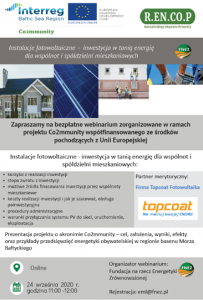
- How can CE projects be beneficial and profitable for citizens?
- What are the advantages and barriers for the development of CE projects?
- What do you need to know to implement an energy project?
- Where to draw the patterns from?
- How to start, where to seek help and what to look for CE projects?
- What are the costs?
- What are the possibilities for co-financing?
- Is it better to act individually or collectively?
- How to use own experience to popularise CE projects and build energy awareness in my “homeland”?
The webinar was attended by, among others, Deputy Mayor Włodzimierz Piątkowski, a legal adviser who, within the scope of his competences, is responsible for the cooperation with the Real Estate Management Company in the Bielany district of Warsaw and a representative of this Real Estate Management Company. The Bielany district has 20.000 residents, 5.700 apartments, 600 commercial premises and 330 hectares of communal land. The webinar was also attended by a representative of the Warsaw Building Cooperative Chomiczowka. The area of the communal land of Chomiczowka is approximately 65 hectares. The cooperative consists of 98 residential buildings with 7.298 apartments.
Goals for the future
Our goal for the future is to support a community to create, invest, build, develop and maintain the CE project based on RES.
The RENCOP is led by the RENCOP Coordinator, who performs executive, operational and administrative functions (depending on the model, stage of the project, and needs agreed upon in a democratic manner). The RENCOP Coordinator may support CE projects at all stages of their implementation: searching for ideas, verifying the possibility of obtaining financial support, motivating and identifying stakeholders (internal and external), organising meetings and consultations, inviting experts, conducting an information campaign and social dialogues (depending on needs). He/She can also support the process of obtaining necessary administrative decisions and/or concessions for a RES project.
If you would like to be a member of this RENCOP group or coordinator of your own RENCOP and support an energy transition focussing on local energy potentials – do not hesitate to join us. Please contact: sekretriat@fnez.pl.
Updates on recent activities and upcoming events in Polish can also be found on the FNEZ webpage.
Sweden has a national goal to have 100% renewable electricity production by 2040. This means that many new RE plants will be built over the next decades. Many of these will be large, but also small-scale projects are needed and play an important role to reach the postulated goal. The Energy Agency for Southeast Sweden is working to support small community-driven projects in the counties of Blekinge, Kalmar, and Kronoberg with a focus on housing cooperatives. The strategy is to provide expert input and show good examples. The advantage is that the housing cooperatives are existing community structures and it is easy to add on an energy part. Also, there is a large potential since about one fifth of all Swedes lives in approximately 1.000.000 apartments organised in housing cooperatives. While cooperatives have a long-standing tradition, especially in the agricultural and retail sectors in Sweden, challenges to energy cooperatives are that the overall national support framework and the grid regulations are not yet adopted to community-driven energy generation, such as solar PV. The new EU-directives (2019/944 and 2018/2001) will improve the situation but are not yet implemented. There are national monetary support systems in place for renewable energy. A barrier is that this system changes often and makes it hard to make a long-term calculation for an investment.
To support as many housing cooperatives as possible, the approach of the Energy Agency for Southeast Sweden is that of an expert RENCOP. The RENCOP is active since 2017 and several meetings and workshops have been held.
- Initially open meetings were organised with all types of citizen organisations/associations being invited.
- Citizens were informed on possibilities for installing Solar-PVs and new rebates in tax law for small-scale RE-systems.
- Open sessions were held where experts and citizens came together to explore new options.
- Expert knowledge from the Lyckansberg housing cooperative (a good example), Linnaeus University, Swedenergy, local grid operators, and generation technology (biomass, PV etc.) experts were provided. Early in the project and onwards, a cooperation with the County administrative board was started.
Quite early in the project, it was decided to focus on housing cooperatives as target group and to try to inspire these to install Solar-PVs. The activities have continued with open meetings throughout the Southeast Sweden region (Kronoberg, Kalmar and Blekinge). More than 200 individual persons have visited the open meetings. Experience shows that especially the contact with other housing associations that already have experience with a solar PV installation (Good practice), is an efficient way to stimulate additional projects. Caution is in place when inviting providers of PV panels and services as the RENCOP organiser should retain its credibility as an independent broker for the interests of the citizens.
In 2019, the RENCOP was reorganised. The network of energy advisers at the municipalities in Southeast Sweden was tied to the RENCOP and forms the basis of the RENCOP experts. These advisers are active in most of the municipalities in Southeast Sweden and are early aware of new initiatives and can give guidance at first hand. Through Co2mmunity, the Energy Agency for Southeast Sweden has arranged open inspiration meetings, given detailed advice, and monitored the progress and barriers for new initiatives.
In 2020, the Covid-19 pandemic has changed the game plan for meeting with people. The Co2mmunity activities have been changed to online meetings. The benefit with this format is that travel has been reduced and people living far away can attend the webinars. The final webinar included virtual site visits to three associations in Southeast Sweden that have installed solar-PVs.
